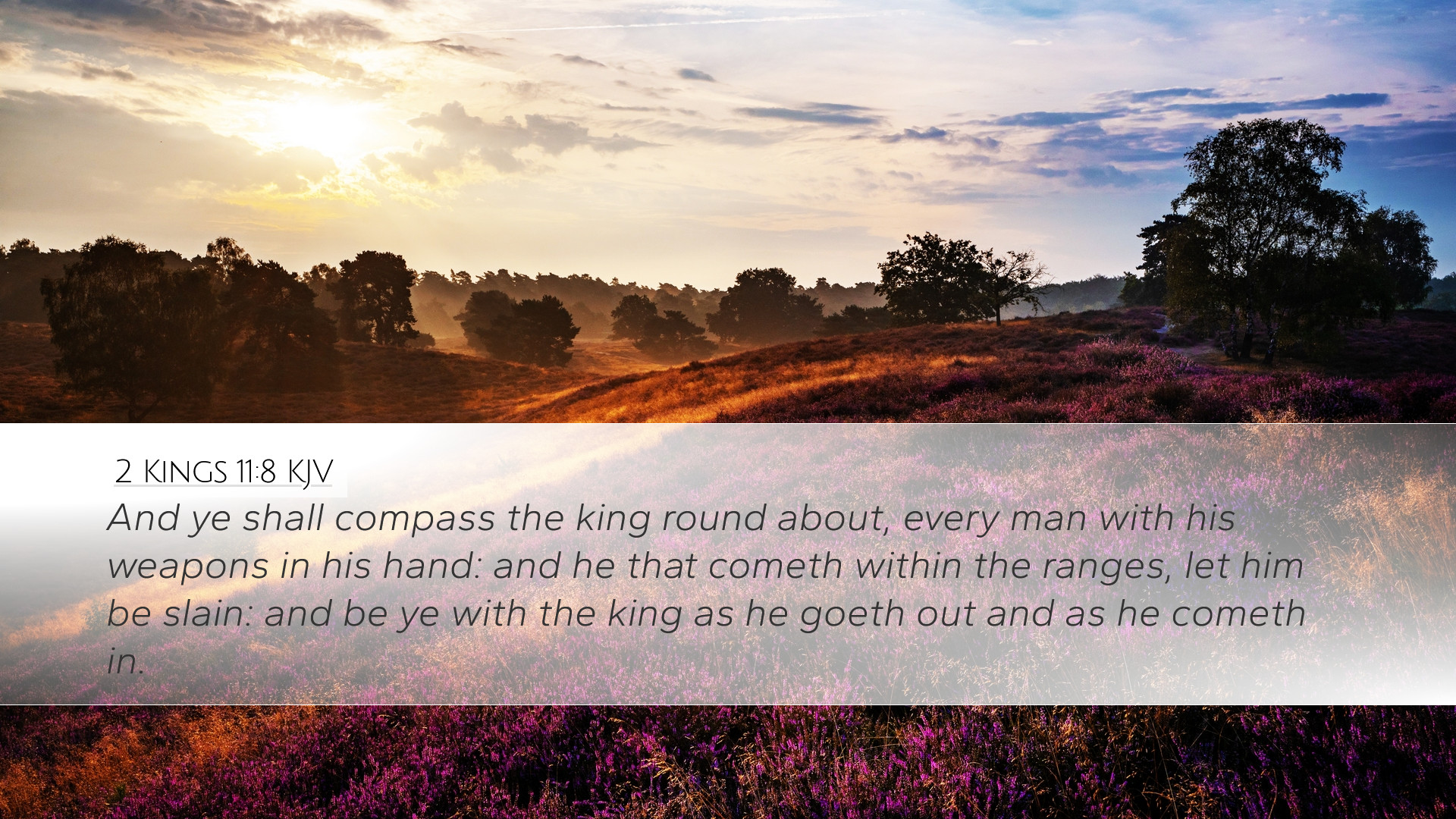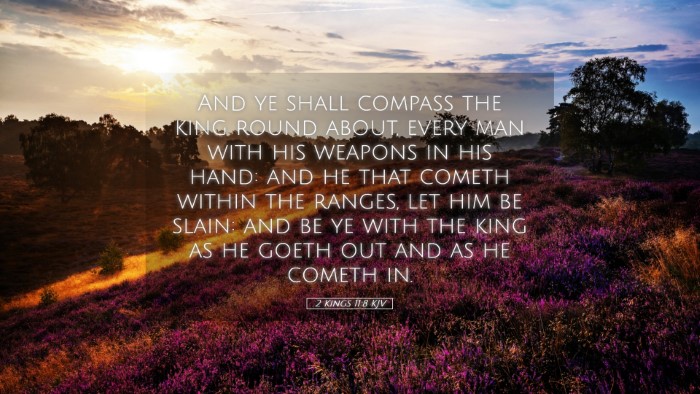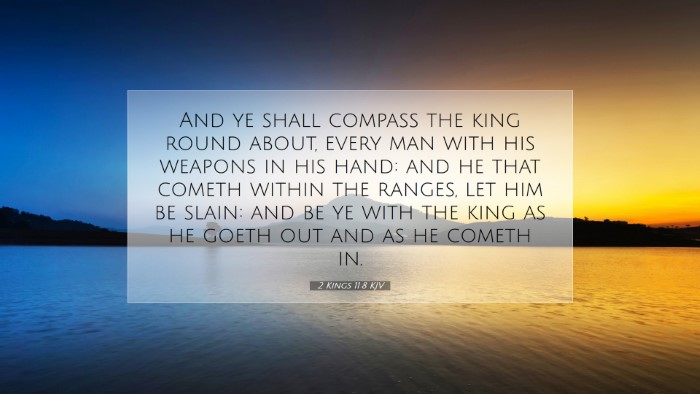Old Testament
Genesis Exodus Leviticus Numbers Deuteronomy Joshua Judges Ruth 1 Samuel 2 Samuel 1 Kings 2 Kings 1 Chronicles 2 Chronicles Ezra Nehemiah Esther Job Psalms Proverbs Ecclesiastes Song of Solomon Isaiah Jeremiah Lamentations Ezekiel Daniel Hosea Joel Amos Obadiah Jonah Micah Nahum Habakkuk Zephaniah Haggai Zechariah Malachi2 Kings 11:8
2 Kings 11:8 KJV
And ye shall compass the king round about, every man with his weapons in his hand: and he that cometh within the ranges, let him be slain: and be ye with the king as he goeth out and as he cometh in.
2 Kings 11:8 Bible Commentary
Commentary on 2 Kings 11:8
2 Kings 11:8 states: "And you shall surround the king, every man with his weapons in his hand; and whoever comes into the ranks, let him be put to death. Be with the king when he comes out and when he goes in." This verse is part of the narrative concerning the protection of Joash, the rightful heir to the throne of Judah, during a time of political upheaval.
Contextual Overview
The context of this verse is essential to understand its significance. Joash is a young child, hidden to escape the murderous intentions of Athaliah, who has usurped the throne. The events lead to a military coup led by Jehoiada the priest, highlighting themes of faithfulness, protection, and the divine purpose in the midst of human chaos.
Key Themes
- Divine Protection: Joash’s preservation signifies God’s faithfulness to His covenant. Jehoiada’s command illustrates a divine orchestration in safeguarding the rightful king, reflecting God’s providence in maintaining His plans.
- Leadership: The responsibilities given to the captains and guards in this verse shows the structure of leadership that is divinely ordained. The protection of the king is not merely a political maneuver but a sacred duty.
- Righteous Remnant: Within the general corruption under Athaliah’s reign, Jehoiada and those faithful to God's covenant emerge as protectors of righteousness. This demonstrates that God always preserves a remnant who are loyal to Him.
Commentary Insights
Matthew Henry's Commentary
Matthew Henry emphasizes the significance of Joash as a vessel of divine will. He contextualizes the verse within God’s overarching plan where even amidst adversity, divine leaders like Jehoiada act in faith. Henry notes that the command “surround the king” depicts a sense of seriousness among the soldiers, who are tasked not only with a military duty but with a protective role against evil forces led by Athaliah.
Albert Barnes' Commentary
Albert Barnes notes on the military structure illustrated here, where it is not just a chaotic upheaval but a carefully planned act of resistance against tyranny. He stresses the importance of adherence to the order given—“every man with his weapons in his hand”—suggesting a readiness to defend what is just. Barnes also highlights the phrase ‘whenever he goes out and whenever he comes in,’ signifying the comprehensive nature of the king's protection, which points to Christ as our protector in every aspect of our lives.
Adam Clarke’s Commentary
Adam Clarke discusses the historical implications of this protective measure, stating that it reflects the overall military strategies employed during such upheavals. Clarke mentions how such commands were typical in reinforcing the loyalty of the armed forces while underlining the grievous consequences for anyone who might act against the king. Clarke appreciates Jehoiada’s wisdom in orchestrating this protection and aligning the military with God’s chosen ruler, thus intertwining divine authority with earthly governance.
Theological Reflection
This verse can be profoundly applied to discussions on leadership within the church and society today. The call to protect the king resonates with the call to protect truth and righteousness within our institutions. The leaders, whether in a military, corporate, or spiritual context, are reminded of the sacred duty entrusted to them. This reminds us of the collective responsibility to uphold Christ’s kingdom here on earth.
Practical Applications
- Faithfulness: Believers are called to remain faithful, much like Jehoiada, in environments that challenge their faith. This verse encourages steadfastness in protecting our spiritual leaders and doctrines.
- Vigilance: The command to surround the king symbolizes the vigilance necessary among church members. Protection of the faith and leadership requires ongoing commitment and readiness to defend against spiritual threats.
- Unity: The collaboration shown in the ranks around Joash reflects the idea of unity in purpose among believers. It is a reminder that together, the body of Christ is stronger in confronting adversity.
Conclusion
2 Kings 11:8 serves not only as a historical account but encapsulates essential truths about divine action, human responsibility, and the unfolding of God’s plans amid turmoil. For pastors and theologians, it serves as a reminder of God's providential care and the necessity of protective leadership within the community of faith. Through this passage, we are encouraged to actively participate in God’s redemptive story, protecting what He has entrusted to us, and remaining committed to the cause of righteousness.


